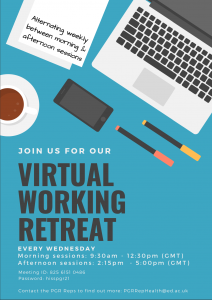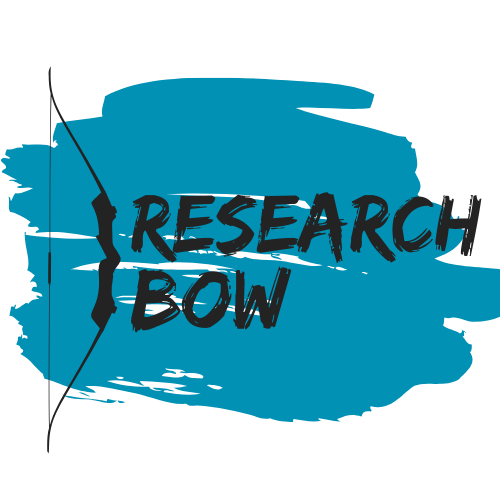Last year was one of the most challenging years for not only our school, but the whole world.
The COVID-19 pandemic not only changed the way we perceive interpersonal communication, but it highlighted how student and academic communities can interact with each other whilst social distancing. As this year’s PGR reps, we strived to learn new strategies to preserve our rich and supportive PGR community in this pandemic context; however, though not all of our ideas have been successful, we are mindful to those that worked well. Thus, today I am focusing on the bright aspects of our rep experience so far and tell you about one of our most popular initiatives during the last semester: The virtual working retreats (VWRs).
What are the VWRs?
VWRs are based on the classic concept of Writing Retreats, which are workshops exclusively dedicated to improving the writing experience through engagement, social support, and reflexivity in student communities. In our—previous ‘pandemic free’—school, the reps organised the Firbush Retreat, which was a writing trip to the Highlands! However, as we all know at this point, plans must change. In the spirit of continuing with this writing retreat tradition, we started periodic, virtual writing retreats for our PGR community. But, considering that not everyone is in a writing stage (or wants to be in a writing stage), we broadened its scope from a writing to a working retreat. With this wider target, everyone can join us to work in different academic activities such as writing—or working towards writing—catching up on readings, making notes, time managing, and still enjoying the advantages of social connection and productivity of writing retreats!
When and at what time are the VWRs?
Last semester, VWRs were conducted every fortnight, mostly on Wednesdays. However, considering that it was a well-attended activity, we plan to offer them once per week in the second semester. As our PGR community is an international group and we have colleagues all over the world, we also offer two time zones to include everyone who wants to participate (GMT shown):
|
Morning block |
Afternoon block |
||
| 9:30-9:45 | Welcome/Goal Setting | 14:15-14:30 | Welcome/Goal Setting |
| 9:45-10:45 | Working Hour 1 | 14:30-15:30 | Working Hour 1 |
| 10:45-11:00 | Break/Discussion | 15:30-15:45 | Break/Discussion |
| 11:00-12:00 | Working Hour 2 | 15:45-16:45 | Working Hour 2 |
| 12:00-12:15 | Goal Reflections | 16:45-17:00 | Goal Reflections |
The reps in charge of the VWRs are connected during the entire session, and PGR members are welcome to join the working retreats for however long suits them—whether this be the whole session, an hour, or the optional social catch up at the session beginning/end.
How do VWRs work on an online platform?
 A week before each VWR, the reps send a calendar invitation with a zoom link attached for the next session. On the day of the meeting, one of the reps facilitates the goal-setting stage in which every attendee shares their personal goals for the session. So far, goals have been related to ethics applications, systematic reviews, teaching training, and reading. After everyone in the session sets up their own goals, we start with the first working hour. Usually, though not compulsory, we switch off our video cameras and microphones whilst remaining connected to the Zoom session. After one hour, one of the reps starts speaking again on Zoom, indicating the first break of the retreat. During this intermission, we may discuss our first hour working; for example, which strategies helped us to be more productive. If someone has questions about their working tasks, this is an ideal opportunity to receive peer advice. After the break, we start with the second working hour, continuing the previous hour’s format. When the second hour is over, all participants ‘gather back’ to share their final session. Thus, in a mere 90 minutes, VWR participants are able to operate in a work-centred, ‘shared space’ to work productively on any given project.
A week before each VWR, the reps send a calendar invitation with a zoom link attached for the next session. On the day of the meeting, one of the reps facilitates the goal-setting stage in which every attendee shares their personal goals for the session. So far, goals have been related to ethics applications, systematic reviews, teaching training, and reading. After everyone in the session sets up their own goals, we start with the first working hour. Usually, though not compulsory, we switch off our video cameras and microphones whilst remaining connected to the Zoom session. After one hour, one of the reps starts speaking again on Zoom, indicating the first break of the retreat. During this intermission, we may discuss our first hour working; for example, which strategies helped us to be more productive. If someone has questions about their working tasks, this is an ideal opportunity to receive peer advice. After the break, we start with the second working hour, continuing the previous hour’s format. When the second hour is over, all participants ‘gather back’ to share their final session. Thus, in a mere 90 minutes, VWR participants are able to operate in a work-centred, ‘shared space’ to work productively on any given project.
What are the benefits of VWRs?
So far, VWRs have demonstrated to be beneficial for myriad reasons. First, VWRs provide a designated, predictable, less distracting environment. For instance, sometimes participants implemented a “no mobile phone zone” or “no email zone” to facilitate task concentration during working hours. Furthermore, in the ‘socialising’ time between or after the working hours, group discussions around working practices and struggles were encouraged. Exchanging experiences and tips allowed participants to reflect on personal practices, as well as support each other during challenging times (trying to be productive after lunch can be tricky). Finally, unfortunately, during the pandemic it has become common for PGR students to work alone at home, which in some cases resulted in reducing working motivation and negatively impacting work attitude. However, working with others, even in an online environment, could increase a sense of accountability, motivation, social support, agency, and peer community. The value of working near others is appreciated in these difficult times! Even if you don’t know anyone at the VWRs, the structure of the activity guides the conversations making it a safe place to meet others.
What are the experiences of PGR members on the VWRs?
What is great about the virtual working retreats is that they are not only a way to keep in contact with the cohort while we are working from home, but it also allows me to set intentions and accountability for my work. Knowing that I have shared my intentions gives me a push to get more done in a short space of time.
Lisa Golds, PhD student in Clinical Psychology
The Virtual Retreat sessions organised by the PGR Reps have been a great support during the last term. I find accountability and the structured work slots particularly useful for my focus and productivity, as I can struggle with procrastination and distraction. Sharing goals has helped me define and plan better my work. The social aspect of the retreat also plays an important role in the process. I work at my best when feeling connected with a learning community; the retreats have definitely provided a platform for creating a supportive learning community in such challenging times.
Valeria Lembo, PhD student in Health and Social Science
The virtual working retreats have been a great initiative in this time of social isolation and working from home. I have never participated in a writing retreat before, so I was positively surprised by how helpful it was to consciously set goals and evaluate them together with other PhD students. Also, it felt a little bit like being in the office and I really enjoy the little moments before and in between work time
Tine Opitz, PhD student in Clinical Psychology
Overall, VWRs have been a successful activity and, as reps, we are thrilled to organise them! We extend the invitation to every member of our PGR community to participate in the upcoming sessions. We strongly believe that the value of VWRs lies in group participation and the incidental social support we can share with each other as a community.





